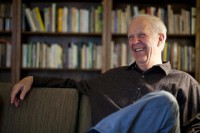Most of us arrive at a sense of self and vocation only after a long journey through alien lands. But this journey bears no resemblance to the trouble-free "travel packages" sold by the tourism industry. It is more akin to the ancient tradition of pilgrimage--"a transformative journey to a sacred center" full of hardships, darkness, and peril.
In the tradition of pilgrimage, those hardships are seen not as accidental but as integral to the journey itself. Treacherous terrain, bad weather, taking a fall, getting lost--challenges of that sort, largely beyond our control, can strip the ego of the illusion that it is in charge and make space for true self to emerge. If that happens, the pilgrim has a better chance to find the sacred center he or she seeks. Disabused of our illusions by much travel and travail, we awaken one day to find that the sacred center is here and now--in every moment of the journey, everywhere in the world around us, and deep within our own hearts.
But before we come to that center, full of light, we must travel in the dark. Darkness is not the whole of the story--every pilgrimage has passages of loveliness and joy--but it is the part of the story most often left untold.
That Parker Palmer sure does have some wonderful wisdom up his sleeve. I appreciate that he does not treat arriving at a sense of self as an easy matter, achieved by following a simple script. As the above quote makes clear, "hardships, darkness, and peril" are an essential part of awakening to our "sacred center."
I often hear people associate talk therapy with ineffective turns toward hardships: "Those bad things that happened are behind me, and that's where they should stay." I also frequently hear fear mingled in with a disdain for traveling through the shadows: "If I venture into the darkness, I'll be swallowed by it, never to emerge again." I hear wisdom in these statements, too. Our minds can be powerful juggernauts, taking us into winding labyrinths that contain terrifying monsters and excruciating shame. We need to make sure we have ample resources to go on pilgrimages and, when we feel depleted, be gentle with ourselves for deciding to staying in places where safety abides.
In the realm of healing, what strikes me as important about perceptions of safety is that we understand them to be real and (AND !) not necessarily true. In other words, we can honor our experience of feeling safe while also recognizing that illusions likely cling to that sense of safety. Our perceptions are not the whole story. We are more than our feelings, thoughts, bodily sensations, and the seemingly inviolable stories we create about all these phenomena, which, as it turns out, are fleeting. Not impermanent.
The illusions we carry about safety and other aspects of our lives usually emerge from earlier attempts at self-protection so we can embark on our pilgrimages with a light touch and plenty of kindness. Fists clench to regain safety when we feel danger. Therefore judgment does not need to accompany our search for the light.
Parker and other wise teachers remind me that I have to go inward to find the sacred center. Others can provide guidance and solace, but they cannot awaken me. They cannot rescue me from the darkness if I am to understand--and understand deeply--that the sacred center is always with and within me. Additionally, we cannot will clarity into being. We often have to get lost and take those falls that Parker mentioned before we open our palms to the sky and surrender to the reality that much of this life is beyond our control.
The beauty of surrender, of letting go, is that we can more readily come back to the present moment and actually inhabit it. Additionally, an open palm provides more space than a clenched fist for insights to emerge. For example, we may come to understand through our pilgrimages that our stories of deficiency actually involve the playing of roles, projected by others and learned over time. With that knowledge, we can unlearn old roles and, in the space generated from that unlearning, focus our attention on living in ways that are not so limited or limiting. We may also come to know that vulnerability--moments of fear, loneliness, and sadness--generated our willingness to play those roles. So we can forgive ourselves and, finally relax with ourselves, understanding that the sacred center really is here. Now.

